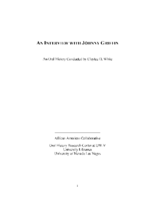Search the Special Collections and Archives Portal
Search Results

Transcript of an interview with Nafeesa Sallee by John Gyrgo, March 21, 2013
Date
Archival Collection
Description
Interview with Nafeesa Sallee by John Grygo, March 21, 2013. Sallee moved to Las Vegas from Cleveland in 1978 and entered into a 34-year banking career from which she retired in 2013.
Text

Transcript of interview with Johnny Griffin by Claytee D. White, September 13, 2010
Date
Archival Collection
Description
Interview transcript with Johnny Griffin by Claytee D. White, September 13, 2010. Griffin grew up in Mississippi where he held a job as a golf caddy. He earned a golf scholarship to Jackson State University, and moved to Las Vegas in 1982. He became involved in Municipal Golf Course and the Tiger Woods Foundation.
Text

Transcript of interview with Ricki Y. Barlow by Claytee D. White, April 10, 2013
Date
Archival Collection
Description
Transcript of interview with Ricki Y. Barlow by Claytee D. White, April 10, 2013. Barlow is a native of Las Vegas, attended Vo-Tech High School and served as student body president. He is a graduate of UNLV, and in 2007 was elected as Las Vegas City Councilman for Ward 5.
Text

Transcript of interview with Trish Geran by Claytee D. White, April 14, 2015
Date
Archival Collection
Description
Trish Geran is too busy to pigeonhole herself into one role. The activist, author, daughter, engineer, filmmaker, public speaker, and student was born and raised in Las Vegas’s Westside community as the fifth and youngest child of Hazel and Johnus Geran. She and her sister attended Catholic elementary school and Bishop Gorman High School, and her brothers went to Madison Elementary School, Roy W. Martin Junior High School, and Las Vegas High School. In this interview Trish discusses the feelings of not belonging that shaped her world view: she was different from her white, wealthy schoolmates, and as a private school student she was different from her neighbors. She found balance through excelling in sports, drill team, and academics. After graduating from the University of Nevada, Las Vegas (UNLV) and cashing in an IRA to work on Barak Obama’s presidential campaign, Trish found out from her mother that the City of Las Vegas was going to close F Street, main link between the Westside
Text
Audio clip from interview with Jocelyn Oats conducted by John Grygo and Claytee D. White, November 20, 2012
Date
Archival Collection
Description
Audio clip from interview with Jocelyn Oats on November 20, 2012. In the clip, Jocelyn talks about the beginnings of Nevada Partners, and her work with the teenaged youth of Las Vegas in the 1990s.
Sound
Audio recording clip of interview with Debbie Conway by Claytee White, March 13, 2013
Date
Archival Collection
Description
Part of an interview with Debbie Conway conducted by Claytee White, March 13, 2013. Conway reflects on strides made locally during the past two decades and gives credit to others in the community for their leadership,
Sound
Audio recording clip of interview with Estralita Williams by Leon B. Green, February 13, 2013
Date
Archival Collection
Description
Part of an interview with Estralita Williams by Leon Green on February 13, 2012. Williams discusses a sit-in by black students to participate in school events and how she accidentally became the sit-in's spokesperson.
Sound
Audio recording clip of interview with Helen Anderson Toland by Claytee D. White, February 21, 2007
Date
Archival Collection
Description
Part of an interview with Helen Anderson Toland by Claytee White on February 21, 2007. Toland discusses her husband, civil rights activist Jim Anderson, and the people who worked in the Las Vegas NAACP.
Sound
Audio clip of Interview with Henry L. Regan Jr. by John Grygo, October 12, 2012
Date
Archival Collection
Description
Part of an interview with Henry L. Regan Jr. by John Grygo on October 12, 2012. Regan discusses racism in high school sports after integration, then Regan's first job as a stock clerk at Vegas Village.
Sound
Audio clip from interview with Al Levy by Cheryl Caples, February 23, 1979
Date
Archival Collection
Description
Part of an interview with Al Levy on February 23, 1979. In this clip, Levy discusses his childhood, living in Las Vegas, and his experience at Las Vegas High School.
Sound
